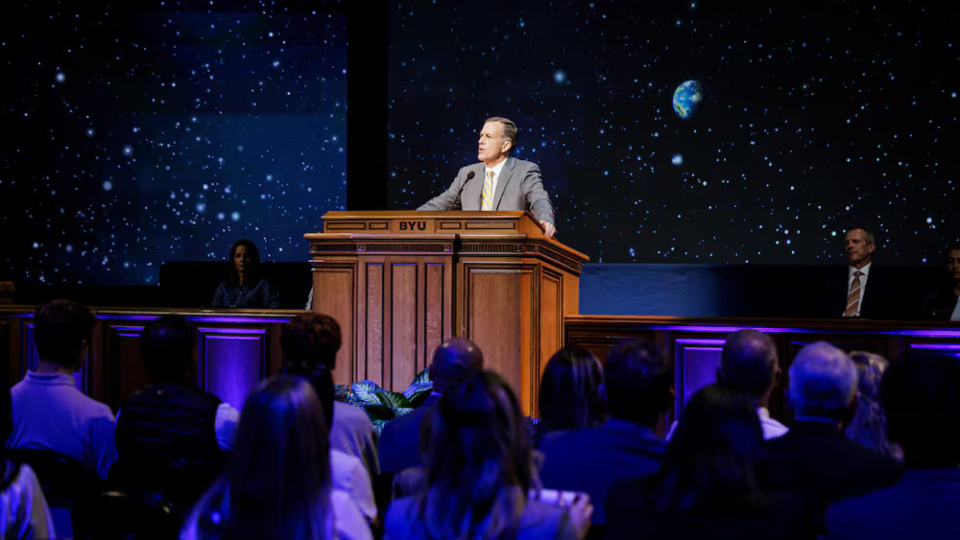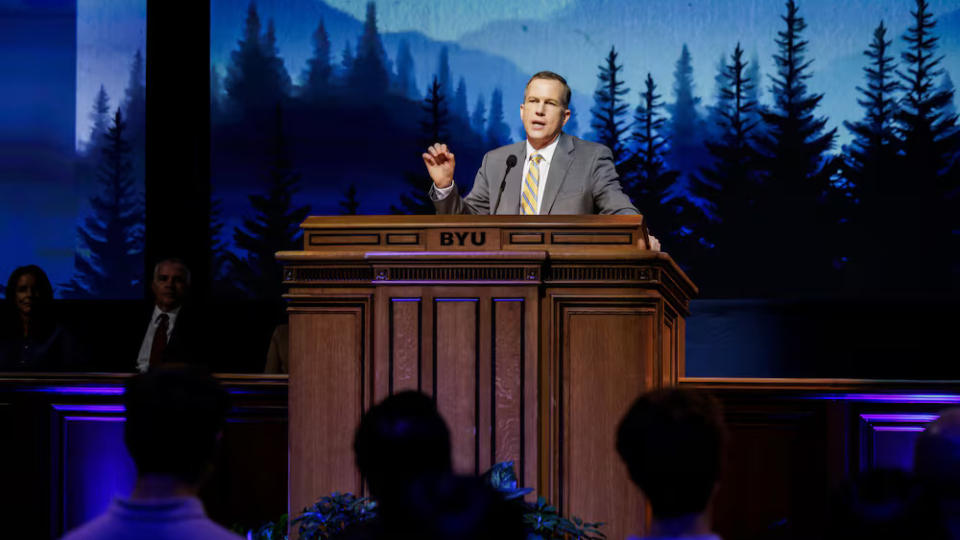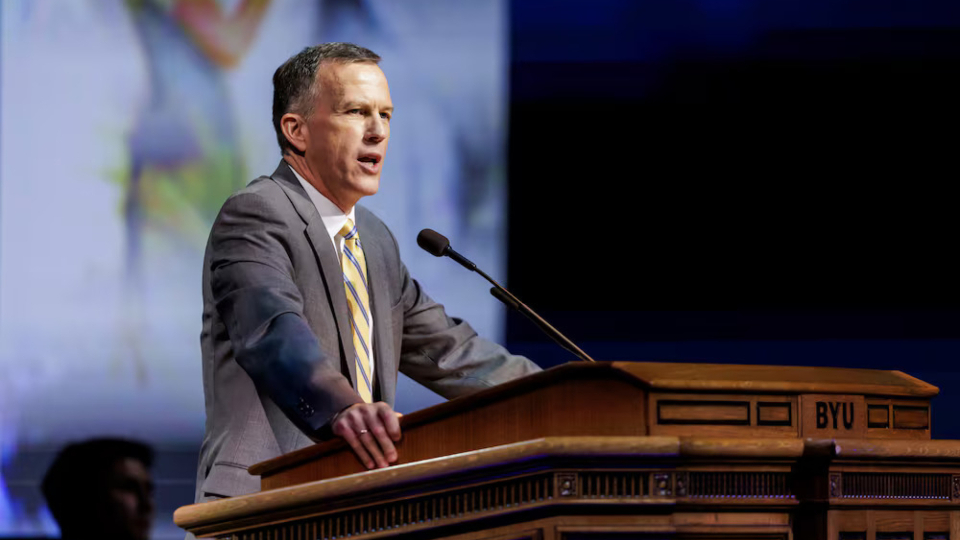
elder-klebingat-byu-1.jpg
Elder Jörg Klebingat speaks during a devotional at Brigham Young University in Provo, Utah, on Tuesday, October 22, 2024. Photo by Joey Garrison, BYU, courtesy of Church News.All rights reserved.This story appears here courtesy of TheChurchNews.com. It is not for use by other media.
By Aimee Cobabe, Church News
The Atonement of Jesus Christ can make one confident to stand before God both today and at the day of judgment. That’s the message Elder Jörg Klebingat, General Authority Seventy of The Church of Jesus Christ of Latter-day Saints, taught students at Brigham Young University on Tuesday, October 22.
“Those of us who love God and give our heart and will over to Him should do so rejoicing in both the giver of the gift, Jesus Christ, and the gift itself, His infinite, personal and practical Atonement, so that there should be no more sorrow in our soul,” Elder Klebingat said.
Attitudes About the Judgment Day
He told the students and staff gathered inside the Marriott Center in Provo, Utah, of four attitudes that prevail regarding the ultimate reckoning with God.
The first attitude is, “In short, do what you want, live it up, take all you can and when you die, it’s over,” he said.
He described the second attitude using a quote from Jonathan Edwards — a theologian of the early 1700s — who said: “The God that holds you over the pit of hell, much as one holds a spider … abhors you.”
The third attitude, he described as the “Eat, drink and be merry, but fear God a little” philosophy.
Finally, the fourth attitude is held by “the imperfect but striving sons and daughters of God who ‘rejoice in the day when [their] mortal shall put on immortality [when] they shall stand before him’ to ‘see His face with pleasure’” (Enos 1:27).

elder-klebingat-byu-2.jpg
Elder Jörg Klebingat speaks during a devotional at Brigham Young University in Provo, Utah, on Tuesday, October 22, 2024. Photo by Joey Garrison, BYU, courtesy of Church News.All rights reserved.Association With Christ
Elder Klebingat then asked if it is possible “for us to know today, within ourselves and by the Spirit, that our current offering and spiritual trajectory will confidently and surely land us in the welcoming embrace of our Father?”
He reviewed our association with the premortal Christ and how that knowledge can help people today in their relationship with Him.
That includes the knowledge that as some of the most noble and faithful among Heavenly Father’s spirit children “we were chosen to come here with Him in these last days.”
He said he likes to picture in his mind what must have been the Savior’s joyful anticipation “that we, His trusted premortal disciples and friends, would continue to be loyal to His cause while here on earth.”

elder-klebingat-byu-3.jpg
Elder Jörg Klebingat speaks during a devotional at Brigham Young University in Provo, Utah, on Tuesday, October 22, 2024. Photo by Joey Garrison, BYU, courtesy of Church News.All rights reserved.Costly Grace
Elder Klebingat quoted Dietrich Bonhoeffer — a German Lutheran pastor — on the difference between “cheap grace” and “costly grace.”
“Cheap grace is the preaching of forgiveness without requiring repentance, baptism without church discipline, [forgiveness] without personal confession,” he said, quoting Bonhoeffer. “Cheap grace is grace without discipleship, grace without the cross, grace without Jesus Christ … grace without price, grace without cost.”
On the other hand, costly grace “is costly because it calls us to follow … Jesus Christ. It is costly because it cost a man His life, and it is grace because it gives a man the only true life. It is costly because it condemns sin, and grace because it justifies the sinner. Above all, it is costly because it cost God the life of His Son: ‘Ye were bought at a price,’ and what has cost God much cannot be cheap for us.”
Elder Klebingat said the covenants made during baptism and in the temple “implies a willingness, a sacred commitment on our part to make His will ours, to want what He wants and to become as He is.”
“Please note that feeling bad, disappointed or troubled after falling short of our covenants and promises is designed to lead us unto repentance, not depression, discouragement or any other destructive thoughts and feelings,” Elder Klebingat said.
Questions to Ask Oneself
He invited students to look up at the “Y” on the mountain, or on a bumper sticker or T-shirt and instead of thinking of the “Y” in BYU, think of the word “yes.”
“‘Yes’ when He asks if you will have Him to be your God, and ‘yes’ when asked if you will give away all your sins to know Him, and ‘yes’ when asked if your love for Him is sufficient to seek costly grace, and ‘yes’ when invited to take the Lord’s side on every issue, and ‘yes’ to His voice being the same as the voice of His prophets and apostles, and therefore ‘yes’ to Him being your judgment day Advocate with the Father,” he said.
He concluded by testifying of the Savior’s reality and of His practical Atonement.
“If you can say ‘yes’ to these and similar questions and mean it, if for you it is the kingdom of God or nothing, you can and should have covenant confidence as you prepare for judgment day, that ‘it is indeed well, it is well with [your] soul’ because of Him,” he said.

elder-klebingat-byu-4.jpg
A choir sings "I Am a Child of God" at the beginning of a devotional at Brigham Young University in Provo, Utah, on Tuesday, October 22, 2024. Photo by Joey Garrison, BYU, courtesy of Church News.All rights reserved.
elder-klebingat-byu-5.jpg
Elder Jörg Klebingat speaks during a devotional at Brigham Young University in Provo, Utah, on Tuesday, October 22, 2024. Photo by Joey Garrison, BYU, courtesy of Church News.All rights reserved.Copyright 2024 Deseret News Publishing Company.